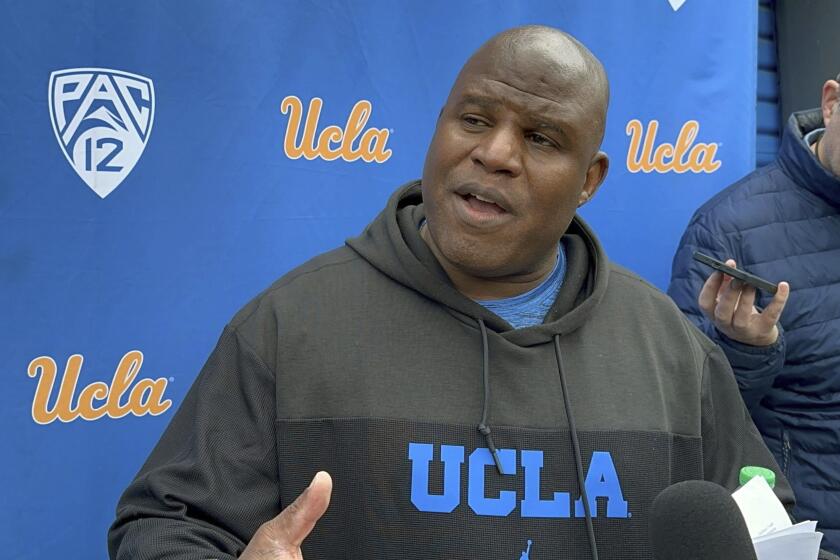Those gym grunts have a purpose
It was the grunt heard around the world.
When Albert Argibay, a 40-year-old corrections officer, emitted a loud Uuuunh! while lifting weights at Planet Fitness, the gym’s manager asked him to quiet down. He didn’t take kindly to the request, and eventually was booted from the Wappingers Falls, N.Y., fitness center.
He then upped the ante, appearing on a local radio station defending his God-given right to grunt.
Bloggers went crazy. Some suggested that gyms have gone too far, adopting overly stringent anti-grunting policies. Although most gyms don’t go as far as Planet Fitness -- which has its official no-grunt policy posted in giant signs on the wall -- many gently discourage it. They say that loud grunting is unnecessary, turns off other members and, in some cases, is just hot-dogging.
Even Gold’s Gym in Venice, a weight-lifter haven and presumably ground zero for heavy grunting, frowns on the practice.
But many fitness experts, some of them grunters themselves, believe the well-placed grunt has a legitimate purpose.
Grunting can provide an emotional boost to the athlete in many ways, exercise physiologists say. A properly timed grunt can help a person stay focused and prepare for an explosive effort. It can also help counter the performance-flubbing effects of nervousness.
Although not exactly a raging debate, it’s certainly on the minds of both gym owners and their patrons. In one corner sit the confirmed grunters who believe that anti-grunt police are cheating them of an inalienable right to vocalize. In the other are managers trying to maintain a pleasant environment for members -- many of whom would rather not listen to loud grunting nor contemplate its attendant associations.
“When you think about grunting, you tend to think about King Kong, moving furniture and sex,” says Belisa Vranich, sports psychologist for Gold’s Gym. Women in particular aren’t big fans, she adds. “Most will say that grunting is disgusting.”
To properly examine the topic, some basic grunt science is in order. Even though grunting during effort is perceived by many as a primitive -- even monkey-like -- behavior, it is also a distinctly human phenomenon, says Michael J. Owren, an acoustic primatologist (some might call him a gruntologist) at Georgia State University.
But there are differences. Even though monkeys and apes grunt plenty, researchers believe they do it as an involuntary response to an emotion, Owren says. In short, you will never see a monkey fake a grunt.
Humans, however, have a unique ability to simulate or exaggerate this sound strictly for effect. In fact, Owren surmises that humans who produce exaggerated effort grunts do so to signal great exertion and, hence, great power. “One can readily imagine that in a fitness and weight-lifting circumstance that it’s being used as a kind of dominance signal,” he says.
A good grunt begins with what’s known as the Valsalva maneuver -- taking a deep breath and holding it, thus closing the glottis, the space between the vocal chords. This causes an increase in pressure within the chest cavity which, in turn, stabilizes the abdominal and chest cavities during heavy lifting. This part of the sequence is quiet.
A grunt occurs when the lifter exerts pressure, and air bursts through the glottis. It might occur before the most extreme exertion or alternatively at the end of exertion, when the lifter exhales the air he or she has just held against the closed glottis.
Most researchers think that grunting on exertion -- the so-called “effort grunt” -- doesn’t confer much of a physiological advantage. Some have scientifically examined the issue. A 1999 study by researchers at Hardin-Simmons University in Abilene, Texas, found that among 31 men ages 17 to 35, grunting while performing a dead lift did not increase maximal force production, a.k.a. lifting ability.
But exercise physiologists do think that grunting prior to an explosive act can help an athlete mentally prepare for the exertion of force. For some athletes, in fact, the grunt is part of a ritual, says Charlie Brown, a sports psychologist in Charlotte, N.C., who is sympathetic to grunters and is an occasional grunter himself.
“It is part of total concentration,” he says. When the athlete is completely focused on the exertion, there is a loss of self-consciousness, and total immersion in the moment. “It really is a matter of giving oneself over to the process,” he says.
Brown makes the grunt sound almost Zen-like.
Any sport that requires explosive bursts of near 100% exertion will have its share of grunters: Weight lifters don’t have the corner on this noise. Football linemen are big grunters. And as elite players Monica Seles and Maria Sharapova showed the world, tennis pros can let rip with an enormous variety of grunts (and yips and yelps) on the court.
There’s no consensus on whether it helps or not, but Brown suspects that grunting may prime the player for the stroke.
In contrast, sports that require more fine motor skills than sheer, physical effort don’t have a lot of grunters because these fine, coordinated movements require more control than force. Nothing will mess up a golf swing or bowling delivery like raw explosive force. (When’s the last time you heard a grunt at your local lanes?)
Some athletic coaches encourage grunting to counter the effects of nervousness. This, says Brown, makes psychological sense. Nervousness can bring on a surge in adrenaline, causing an athlete to take short shallow breaths. Taking a deep breath, then exhaling deeply -- with a grunt if necessary -- can calm down the athlete.
Finally, some athletes believe that uttering certain power words, such as “strong, strong, strong,” can help them focus, and these words can morph into grunts and groans and screams, says Fabio Comana, an exercise physiologist for the American Council on Exercise and former strength coach for San Diego State University. “These athletes feel like they can give their maximum force by giving a good ‘Uhhhmp,’ ” he says.
The grunt, undoubtedly, can be irritating to those who must hear it, but grunting has a less-known consequence to the grunters as well. Loud, unremitting grunting can wreak havoc on delicate vocal chords, says Dr. Clark Rosen, director of the University of Pittsburgh Voice Center. He’s treated his share of recreational weight lifters dogged by hoarseness and other throat problems brought on by years of grunting.
Weight lifters are particularly vulnerable to voice problems because of the way they prepare for the lift, he says. Prior to lifting, they’re squeezing the vocal chords together very tightly, so that no air can escape. That’s bad enough. But finishing off this particularly tight squeezing with the flourish of a grunt can irritate -- and eventually even damage -- the vocal chords.
Over time, Rosen says, lifters run the risk of developing calluses or lesions on the vocal chords, “similar to the person who screams or sings.”
“We advise them not to grunt while weight lifting or allow a little air while doing it,” he says -- so that the vocal chords are not squeezing together as tightly and are less apt to be injured. “The breathier the grunt, the better.”
A bonus: This also makes for a quieter grunt.
Yet the urge to grunt runs deep, Owren says: Effort grunts, he notes, are one of the first vocalizations made by infants. Hard-core weight lifters may be as apt to take this advice as the average American is to heed the call to eat right and exercise.
In other words, as hard as gyms try to discourage grunting, they are fighting an uphill battle. As long as people are inclined to lift weights, move furniture and have sex, the well-timed grunt will never die.
It’s only human.
More to Read
Go beyond the scoreboard
Get the latest on L.A.'s teams in the daily Sports Report newsletter.
You may occasionally receive promotional content from the Los Angeles Times.










